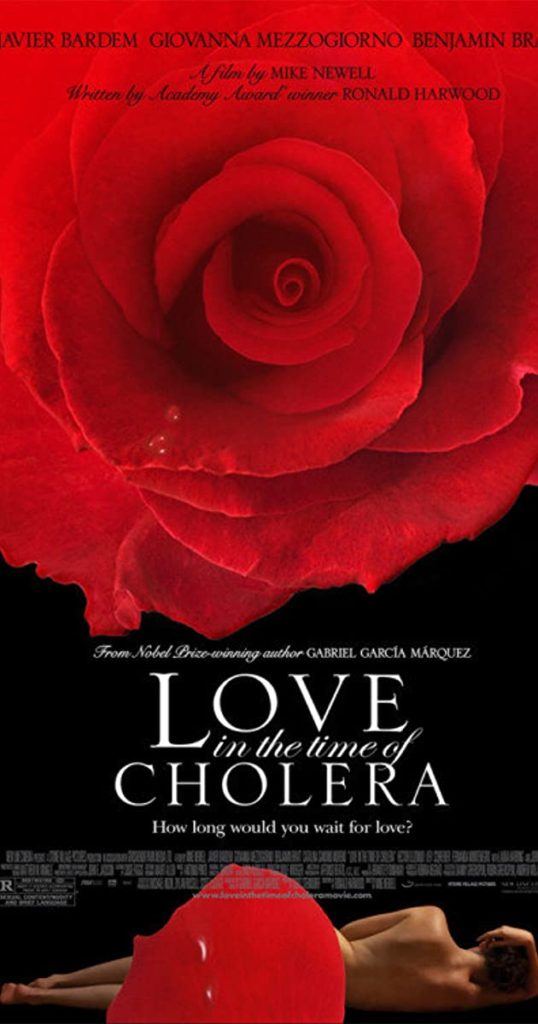
Tuesday
I had meant to blog on my 47th wedding anniversary yesterday but had to wait until I could track down a copy of Love in the Time of Cholera, which seemed the most appropriate text. After all, the love in the novel, finally consummated under the cholera flag, is about the ups and downs of a long-time relationship. “Fifty-three years, seven months, and eleven days and nights,” to be exact.
First, however, I turn to a poem, Ezra Pound’s “The River Merchant’s Wife: A Letter,” since it too captures how our marriage has evolved. To be sure, I didn’t know Julia as a child, nor did I marry her at 14, nor did she timidly keep her eyes focused on the ground and scowl for a year (quite the contrary!). As with the speaker, however, something beautiful and deep has grown out of our youthful confusions.
I love the images of time piling up, even though in the 16-year-old speaker’s case it is only five months, not 48 years. Moving as we are into the autumn of our own life, I can see as as paired butterflies, changing with the seasons:
By the gate now, the moss is grown, the different mosses,
Too deep to clear them away!
The leaves fall early this autumn, in wind.
The paired butterflies are already yellow with August
Over the grass in the West garden;
They hurt me.
I grow older.
In Gabriel Garcia Marquez’s novel, Florentino Ariza and Fermina Daza have loved each other all their lives, but only when they are old and her husband has died can they finally come together. They embark on a river cruise and then realize that, if they can get the captain to fly the cholera flag, they can sail without stopping at any ports.
The captain, inspired by their love, brings his own love on board and the four of them are still sailing when the book reaches its end. Navigating under the cholera flag gives their love an extra edge, and while our situations aren’t the same, I have noticed that living with Julia in the age of the coronavirus has also made life seem especially precious. Since we are both retired, life is quiet, but we are aware of illness and death on the horizon. Our time in relative isolation reminds me of that boat ride.
The book ends with the captain trying to figure out how to get out of “the mess he had gotten into with the cholera flag,” at which point Florentino Ariza broadens his vision:
Florentino Ariza listened to him without blinking. Then he looked through the windows at the complete circle of the quadrant on the mariner’s compass, the clear horizon, the December sky without a single cloud, the waters that could be navigated forever, and he said:
“Let us keep going, going, going, back to La Dorada.”
Fermina Daza shuddered because she recognized his former voice, illuminated by the grace of the Holy Spirit, and she looked at the Captain: he was their destiny. But the Captain did not see her because he was stupefied by Florentino Ariza’s tremendous powers of inspiration.
“Do you mean what you say?” he asked.
“From the moment I was born,” said Florentino Ariza, “I have never said anything I did not mean.”
The Captain looked at Fermina Daza and saw on her eyelashes the first glimmer of wintry frost. Then he looked at Florentino Ariza, his invincible power, his intrepid love, and he was overwhelmed by the belated suspicion that it is life, more than death, that has no limits.
“And how long do you think we can keep up this goddamn coming and going?” he asked.
Florentino Ariza had kept his answer ready for fifty-three years, seven months, and eleven days and nights.
“Forever,” he said.
In a 1988 New York Times review, novelist Thomas Pynchon reflects upon the meaning of this end, arriving at a conclusion that touches on my own decades-long relationship:
This novel is also revolutionary in daring to suggest that vows of love made under a presumption of immortality – youthful idiocy, to some–may yet be honored, much later in life when we ought to know better, in the face of the undeniable.
And later:
There is nothing I have read quite like this astonishing final chapter, symphonic, sure in its dynamics and tempo, moving like a riverboat too, its author and pilot, with a lifetime’s experience steering us unerringly among hazards of skepticism and mercy, on this river we all know, without whose navigation there is no love and against whose flow the effort to return is never worth a less honorable name than remembrance–at the very best it results in works that can even return our worn souls to us, among which most certainly belongs Love in the Time of Cholera, this shining and heartbreaking novel.
Starting off as youthful idiots, Julia and I have steered among the hazards of skepticism and mercy. I know the journey won’t actually last forever, that we sail under a flag of mortality. Yet with love at the tiller and remembrance casting a glow over the years, I find that my feelings have deepened. I am realizing what the captain realizes while gazing at the lovers: “that it is life, more than death, that has no limits.”

